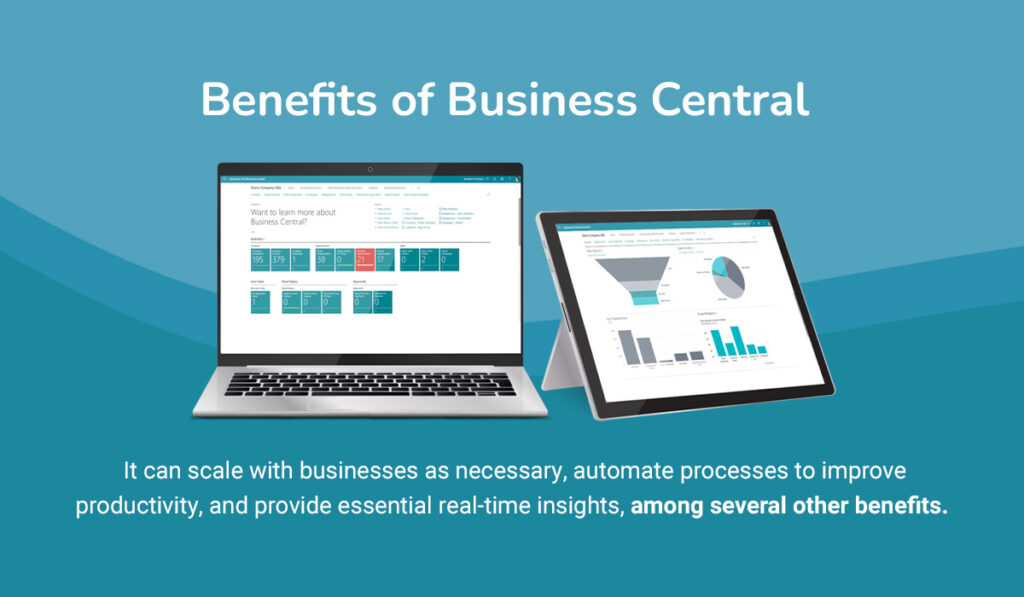Is Business Central a Good Fit for a Supply Chain Company Running GP?

If you are a supply chain company of any size still running Microsoft Dynamics GP, you are likely considering modern enterprise resource planning (ERP) software. GP was and still is a powerful ERP solution. Unfortunately, it was not built for the web, and Microsoft is phasing it out in favor of Microsoft Dynamics 365 Business Central — GP support and updates end December 31, 2029.
While several very capable cloud ERPs are available, there are distinct advantages to staying within the Microsoft suite of Dynamics products, and Business Central should be on your shortlist. Still, companies that rely on complex supply chains and multiple warehouses have unique requirements, and you might wonder if Business Central is up to the task.
Challenges with GP
GP has struggled to keep pace with software updates and business demand. In the world of supply chain ERP, aspects like demand planning, real-time inventory tracking, and sales forecasting are crucial. While GP has served supply chain businesses well, new ERPs offer all the tools these companies need without the challenges GP’s legacy software presents.
Functionality limitations
Modern ERPs feature real-time data reporting and analysis, which is crucial for supply chain management. Because users can access up-to-date information across dashboards and reports stored in the cloud, they can make quick, informed decisions that keep operations on track.
Unfortunately, GP lacks the same reporting and analytics capabilities. It relies on manually created reports that can result in human error and subsequent delays, meaning stockouts, unoptimized stock levels, and similar issues are a concern.
Integration issues
Compared to modern solutions like Business Central for supply chain management, GP has difficulty integrating with applications and tools companies use daily. Its outdated setup makes streamlining workflows and improving efficiency a struggle — a disconnected ERP system can cause data silos and entry errors that make everyday tasks more challenging.
Scalability concerns
GP generally can’t handle significant company growth, which can present major problems when supply chain businesses expand. For example, as soon as a business begins handling larger datasets, GP will start lacking in efficiency. These issues with scalability are particularly concerning for companies looking to go international, as GP’s features are difficult to align with global regulations and currencies.
Benefits of Business Central

For most companies running GP, Business Central will prove more than capable for your current needs and foreseeable growth. Business Central is a flexible, intuitive, cloud-based ERP that can integrate with both Microsoft and third-party applications. It can scale with businesses as necessary, automate processes to improve productivity, and provide essential real-time insights, among several other benefits.
Business Central comes with native features required by companies to manage their complex supply chains, including:
- Purchase management: Business Central helps increase efficiency, reduce costs, and maintain accurate records of your purchasing activities. Capabilities include purchase orders, vendor management, order tracking, vendor invoices, analytics, and integration with third-party software like inventory management, financials, and sales.
- Inventory management: Manage your inventory by tracking stock levels, locations, and movements. Set up reorder points, manage item variants, perform inventory counts, and gain visibility into inventory valuation.
- Warehouse management: Business Central provides receiving, shipping, and internal transfers warehouse management capabilities, as well as bin and location management, item tracking, multi-site inventory, lot and serial number tracking, cycle counting, and inventory put-away and pick processes.
- Demand planning and forecasting: Predict future demand using historical data to assist with inventory planning and purchasing decisions.
- Supply chain analytics: Business Central provides reporting and analytics features to help you monitor and analyze key supply chain metrics, such as purchase order management and supplier collaboration. Additional capabilities are available through third-party add-on products.
Business Central integrations
When navigating supply chain management in ERP systems, integrations are essential. Being able to create connected, seamless processes makes all the difference in an effective and productive supply chain environment.
While Business Central does not come with native capabilities for freight and logistics, it integrates easily with many third-party logistics (3PL) and transportation management systems (TMS) for shipment tracking, carrier selections, and documentation management. GP users will be familiar with utilizing independent software vendor (ISV) solutions but will find they need fewer of them to create the supply chain functionality they specifically need.
Business Central also integrates with the Microsoft Power Platform, a suite of low-code/no-code tools for nontechnical end users to access and analyze the information they need. The Power Platform includes Power Apps, Power Automate, Power BI, Power Pages, and Power Virtual Agents.
Business Central is also supported by a robust community of ISVs who develop solutions that extend Business Central’s capabilities.
Should you migrate to Business Central?
With Microsoft’s plans to sunset GP over the next few years, the company is encouraging current GP users to migrate to Business Central. For some businesses, staying with Microsoft is the obvious approach and may seem less complex than adopting an ERP from an entirely new provider. Other companies may be unsure about migrating to Business Central.
The decision comes down to your business’s goals and needs. If your team is considering Business Central, consider how it differs from GP in terms of ERP capabilities, ISV availability, data security features, and other aspects.
Learn more about Business Central from ArcherPoint
While there is no one-size-fits-all ERP solution, GP users looking to migrate to a cloud ERP should consider Dynamics 365 Business Central for supply chain management. Between improving accessibility and visibility, supporting data security, and providing advanced functionality and integrations, Business Central offers everything most supply chain companies need to stay competitive.
Deciding on a new ERP is no easy feat. At ArcherPoint, we understand how important your ERP is to your company’s success, which is why we work with businesses to make the ERP selection and migration experience as straightforward as possible. As your Microsoft partner, we’ll work with your team to identify the best replacement for GP.
Want to find out more? See if Business Central may be a good fit for your organization by taking our quiz. Then, request a free assessment to determine whether Business Central is right for you.

Trending Posts
Stay Informed
Choose Your Preferences
"*required" indicates required fields
